The Argonauts and the Argonautic Expedition
An important event in Greek mythology , from where we can hardly trace the historical events, but they exist even if they are sufficiently covered by the veil of mythology, is the Argonautic expedition.
The Argonautic expedition must have taken place between 1400-1350 BC. Abraham lived around 1200 BC. and he was a contemporary of Agamemnon, Theseus, and so many other well-known ancients, and later than Herakles and of course the Argonautic expedition. According to Augustine of Hippo, Deucalion and Prometheus were contemporaries of Moses, Epimetheus and Pandora.
Jason’s companions, the Argonauts, were all famous heroes. Among them were Heracles, Theseus, the Dioscouri of Sparta, Castor and Polydeuces, Atalanti from Arcadia, the sons of the Aeacus Peleus and Telamonas, Asclepius, the two winged children of Boreas from Thrace, , Laertes from Ithaca the father of Odysseus, Orpheus with his magic lyre, Admetus, Argos who is said to have been the son of Phrixus and many others, fifty in number, as many as the oars of Argos. And then began a long journey full of adventures, because Jason and his crew did not know for sure which way they should go.
The Argonauts were about thirty by number, and most of them were heroes like Heracles, Orpheus, Theseus, Castor and Polydeukes, Telamon, Peleus and Typhus.
LIST OF THE ARGONAUTS
| JASON | HERACLES | ORPHEUS |
| THESEUS | PELEUS | ARGUS |
| MELEAGER | CASTOR | POLYDEUKES |
| AMPHIARAOS | TYPHUS | TELAMON |
| ZETHOS | ATALANTA | AMPHION |
| PENELAOS | CEPHEUS | EURYDAMAS |
| EPIBOTES | CAUTIOS | IALMENOS |
| ERGENOS | PHALEROS | AUGEAS |
| AKASTOS | IPHEHOS | IDAS |
| MOPSOS | EUPHEMOS | STAFYLOS |
The story before the Argonautic Expedition
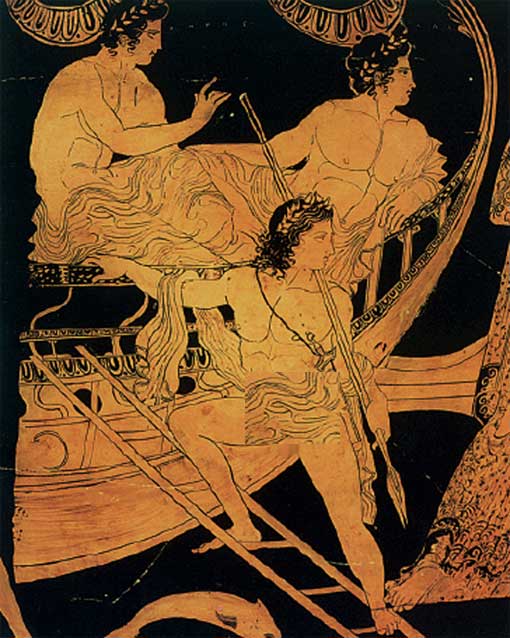 King Athamas once lived in Orchomenos in Boeotia with his wife Nefeli and their two children, Phrixo and Elli. However, Nefeli died and Athamas married another woman, Ino.
King Athamas once lived in Orchomenos in Boeotia with his wife Nefeli and their two children, Phrixo and Elli. However, Nefeli died and Athamas married another woman, Ino.
Ino hated Frixo and Elli to death. That is why he called the women of Orchomenos and persuaded them to bake the wheat that their men would sow, because then they would have a better harvest. However, the baked wheat did not sprout at all and the inhabitants of Orchomenos were hungry that year.
Worried, the king sent people to the oracle of Delphi to ask why the wheat did not grow. Ino, however, paid off the king’s emissaries and convinced them to lie to Athamas. So they told him that the oracle given to them by the Pythia said that, in order for the land of Orchomenos to bear fruit again, the king had to sacrifice his son, Phrixo, on the altar of Zeus.
Athamas decided to obey and sacrifice his child. But when they put Phrixo on the altar, his mother, Nefeli, sent a golden-haired ram, which took Phrixos and Helli on its back and flew far to the East. Picture
The ram flew over the Aegean Sea. But when crossing the narrow sea between Thrace and Asia Minor, Elli became dizzy, fell and drowned. Since then this sea has been called Hellespont.
Sorrowful, Phrixos continued his journey until he reached Colchis. There he sacrificed the ram to Zeus and gave its golden skin, or fleece, as it was called, to the king of Colchis, Aetis, who hosted him. He hung it on an oak tree in the forest of the god Ares and had a sleeping dragon guard it.
Pelias and Jason
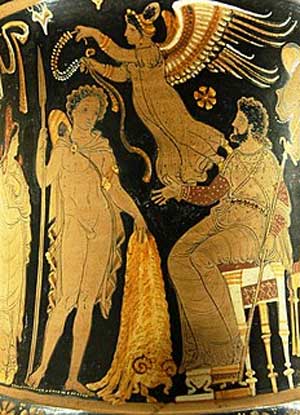 In the age of heroes and myths, the king of Iolkos, Aesonas, arrived one dark night on Mount Pelion with his young son, Jason. His brother Pelias had usurped his throne and Aesona, fearing for his son’s life, secretly brought him to Pelion in the cave of the centaur Chiron.
In the age of heroes and myths, the king of Iolkos, Aesonas, arrived one dark night on Mount Pelion with his young son, Jason. His brother Pelias had usurped his throne and Aesona, fearing for his son’s life, secretly brought him to Pelion in the cave of the centaur Chiron.
Jason grew up near the Centaur Chiron and became a very intelligent and strong young man. When he turned twenty years old, he decided to return to Iolkos, to take back his father’s throne from Pelias.
Going towards Iolko, on the bank of a river, he met an old woman who begged him to cross her. It was the goddess Hera transformed, who wanted to test his goodness.
Willingly Jason took her on his shoulders. However, trying to cross the river, he lost one of his sandals and arrived in the city with only one sandal.
Jason, therefore, could only accept to attempt this feat, in order to prove his worth to the people of Iolkos as well. First he had to build a boat and find companions who would accompany him on the long journey to Colchis. However, in this last he had no problem at all, since as soon as he sent heralds throughout the territory, all the Greek heroes ran to his call.
The goddess Athena herself taught them the art of assembling the pieces for a large and strong ship. He even gave them a wonderful piece of wood to make the bow from the miraculous oak of Dodoni, which through the mediation of Zeus gave oracles. That piece of wood had the gift of speech. The ship was named “Argo” in honor of Argo, who was responsible for its construction, and it meant bright
THE GOLDEN FLEECE
However, his uncle, Pelias, had received an oracle from the oracle of Delphi that told him: “be afraid of the single sandal”! So when he saw the boy with the one sandal, he immediately knew who he was and was very upset. And when Jason asked him for his father’s throne, he told him that he would give it to him if he brought him the golden fleece from Colchis.
Jason accepted and immediately ordered Argos, who was a famous craftsman, to build him a strong ship with fifty oars. Hera helped to bring pine logs from Pelion and with Athena’s help Argos built a very strong ship. Athena herself nailed to his bow a piece of wood from the sacred oak of Zeus in Dodoni, which had a human face and prophesied the future. The ship was named Argo.
Fifty more heroes from all over Greece came to help Jason. Among them were Hercules, Theseus and the famous musician, Orpheus. All of them were called Argonauts.
Traveling to Colchis, the Argonauts stopped in Thrace. There they met the soothsayer Phineas, who revealed to them that they would meet the Entwined Stones on their journey and advised them, before passing between them, to let a dove pass first. If the dove passed, so would Argo.
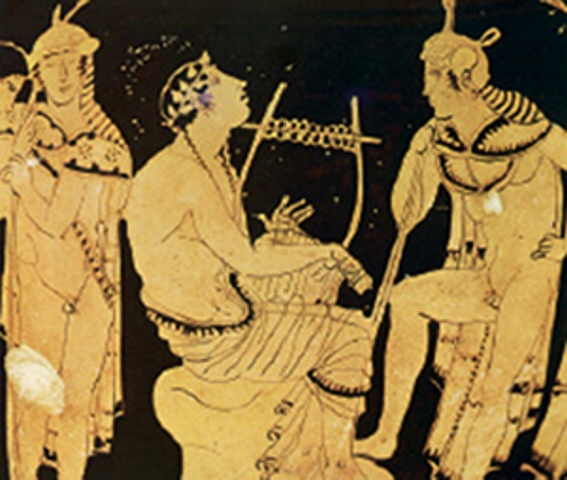
Orpheus and Eurice
Orpheus was a musician from Thrace. When he sang and played his lyre, the sea calmed down, the animals slept and the branches of the trees swayed to the rhythm of his music. Some say that he was the son of Apollo and that Apollo gave him the lyre.
Orpheus loved and married the nymph Eurydice. However, Eurydice died from a snake bite. Inconsolable, Orpheus took his lyre and descended to Hades. As he began to play and sing, Cerberus slept, the dead came to listen, and Persephone and Pluto, enchanted by his music, agreed to give Eurydice back to him, on one condition: until he came out of Hades, he would not turn back to see her. However, shortly before Orpheus came out of Hades, he could not stand it and turned to see Eurydice. She then disappeared forever into the darkness.
The Argonautic expedition
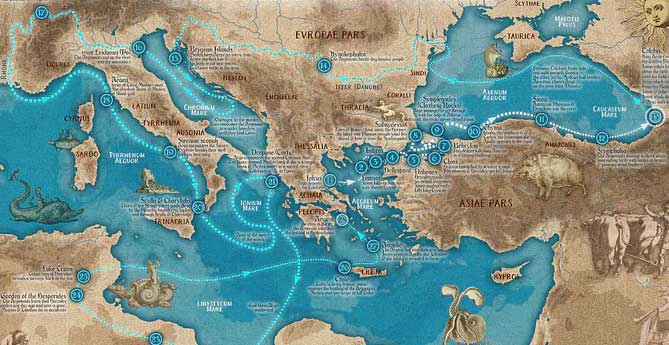 The Argo, after crossing the Aegean and the Hellespont straits, arrived at Sympligades stones. These were two huge rocks that opened and closed and crushed the passing ships. The Argonauts, following the advice of Phineas, before entering the narrow passage, let a dove pass. The pigeon passed and only its tail was slightly caught on the edge by the rocks. Then the Argonauts quickly hit their oars and with the help of Hera, the Argo also passed, which only hit a little on her stern. Since then these rocks have remained immobile forever.
The Argo, after crossing the Aegean and the Hellespont straits, arrived at Sympligades stones. These were two huge rocks that opened and closed and crushed the passing ships. The Argonauts, following the advice of Phineas, before entering the narrow passage, let a dove pass. The pigeon passed and only its tail was slightly caught on the edge by the rocks. Then the Argonauts quickly hit their oars and with the help of Hera, the Argo also passed, which only hit a little on her stern. Since then these rocks have remained immobile forever.
Traveling east, the Argo reached Colchis. There Jason presented himself to King Aetis and asked him for the golden fleece. He told him that he would give it to him if he managed to do some difficult tasks. That is, to bind two bulls with bronze feet and fiery breath, to plow a field with them, to sow dragon’s teeth and to kill the armed giants that would spring up from the earth.
Jason accepted and with the help of Aeetis’ daughter, Medea, who was a famous witch, he tied up the wild bulls, plowed and sowed dragon’s teeth. Immediately armed giants sprang from the earth and surrounded him. Jason immediately threw a large stone between them, as Medea had advised him. The giants then began to beat each other until they were all killed.
After this feat of Jason, Medea learned that her father did not intend to give the golden fleece and instead planned to burn Argo. Then Jason ordered the Argonauts to sit on the oars of the Argos and he
with Medea and Orpheus, when evening came, they ran to the forest of the god Ares. There Medea poured magic liquid into the eyes of the dragon guarding the fleece. Orpheus played his lyre very sweetly and the dragon fell asleep. Immediately Jason grabbed the golden fleece. They ran quickly to the sea, all entered the Argo and left Colchis.
When they returned to Iolkos, Pelias did not keep his word and did not give the throne to Jason. He married Medea and they went to Corinth together. They dedicated Argo to Poseidon, and, so that everyone would remember the Argonautic campaign, they decided to hold games there in honor of Poseidon.
Jason often went and sat near Argo. Once, however, and when he had become an old man, a piece of wood fell from the mast of the Argos and killed him.
Other monsters in the myth
Talos
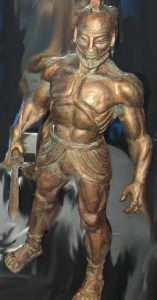 In order to reach the Argonauts from Colchis to Iolkos, they wandered a lot in the sea. They also passed through Crete. However, the island of Crete was guarded by the bronze giant Talos, who circled the island three times a day and prevented foreign ships from approaching the coast.
In order to reach the Argonauts from Colchis to Iolkos, they wandered a lot in the sea. They also passed through Crete. However, the island of Crete was guarded by the bronze giant Talos, who circled the island three times a day and prevented foreign ships from approaching the coast.
Talos had only one vein of blood that started from his neck and reached his ankle and was closed there with a copper nail. When he saw Argo approaching, he started throwing huge rocks at her.
However, Medea, with her magical sight and her spells, convinced him to let them approach, so that she could remove the copper nail from him, so that he would become immortal. Talos believed her.
But when Medea pulled the bronze nail from his foot, all his blood spilled out and Talos fell dead.
